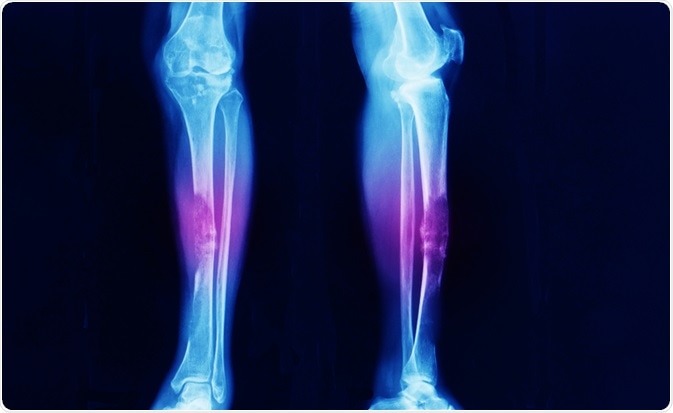Bone cancer developed in any of the bones of the body is known as primary bone cancer. In contrast, secondary bone cancer is a type of cancer that has spread from other parts of the body to the bone. In most cases, primary bone cancer develops in the pelvis or long bones in the arms and legs.
 Image Credit: Yok_onepiece / Shutterstock.com
Image Credit: Yok_onepiece / Shutterstock.com
What are the types of bone cancer?
The term 'bone cancer' does not include cancers that have originated elsewhere in the body. According to the American Cancer Society, bone cancer is very rare, accounting for less than 0.2% of all cancer types.
Bone cancer is of many types, including osteosarcoma, Ewing sarcoma, chondrosarcoma, spindle cell sarcoma, chordoma, and angiosarcoma.
Osteosarcoma occurs in the bone cells and most commonly affects the bones in the leg and upper arm. The characteristics of osteosarcoma are similar to spindle cell sarcoma.
Ewing sarcoma, which primarily affects young children and teenagers, occurs mostly in the pelvis, shin, and thigh bones. In rare cases, it can occur in the soft tissues in the body.
Chondrosarcoma, which primarily affects middle-aged people, occurs mostly in the pelvis, hip, and shoulders. Sometimes, it can develop in the soft tissues near the bones.
Chordoma is a type of slow-growing cancer that mostly affects the spinal bones.
Angiosarcoma can occur simultaneously in more than one bone, and it mostly affects the soft tissues rather than the bones.
What causes bone cancer?
The exact etiology of bone cancer is unknown. However, there are certain factors that can increase the risk of developing bone cancer. For example, the presence of some rare, inherited genetic conditions, such as Li-Fraumeni syndrome, multiple osteochondromas syndrome, and retinoblastoma can make people more susceptible to develop bone cancer.
Paget's disease, which is a benign bone disorder, is known to increase the bone cancer risk in about 1% of people. Similarly, people with benign cartilage tumors (enchondromas) are at higher risk of developing chondrosarcoma.
Exposure to high doses of radiation during cancer-related radiotherapy increases the risk of bone cancer in the exposure site. Accumulation of radioactive minerals in the bones is the main causative factor for increased susceptibility. In addition, certain chemotherapeutic drugs used to treat cancers, such as alkylating agents and anthracyclines, may increase the bone cancer risk.
People who have undergone bone marrow transplantation may also be at higher risk of developing bone cancer.
What are the signs and symptoms of bone cancer?
The signs and symptoms of bone cancer can sometimes be similar to that arising from other conditions, such as arthritis, osteoporosis, or bone injury. Therefore, proper diagnosis is essential to ensure correct treatment.
The most common symptom of bone cancer is pain and swelling in the affected bone region. Initially, pain is intermittent. It becomes prominent at night or during activity. However, the pain becomes severe and chronic over time.
Swelling in the affected bone region can only be noticed when the tumor is big enough. Sometimes, it is also possible to feel a lump developing at the tumor site. Cancer developed in the neck bone can cause lump formation in the back of the throat, causing difficulty swallowing or breathing problems.
Bone cancer developed near a leg or arm joint can make movement difficult. Cancers in the leg bones can lead to noticeable limp. In addition, cancers developed in the spinal bones can press the nerves, leading to numbness/weakness and tingling in the arms or legs.
Weakening of the bone due to cancer can increase the risk of fractures. This is called pathological fracture.
Other general symptoms of bone cancer include fatigue and weight loss. Having a high temperature or excessive sweating is also possible. These symptoms are more common in Ewing sarcoma patients.
In some rare cases, bone cancer patients can suffer from anemia. Moreover, people can experience breathing problems if the cancer spreads to the lungs.
Further Reading
Last Updated: Dec 18, 2019